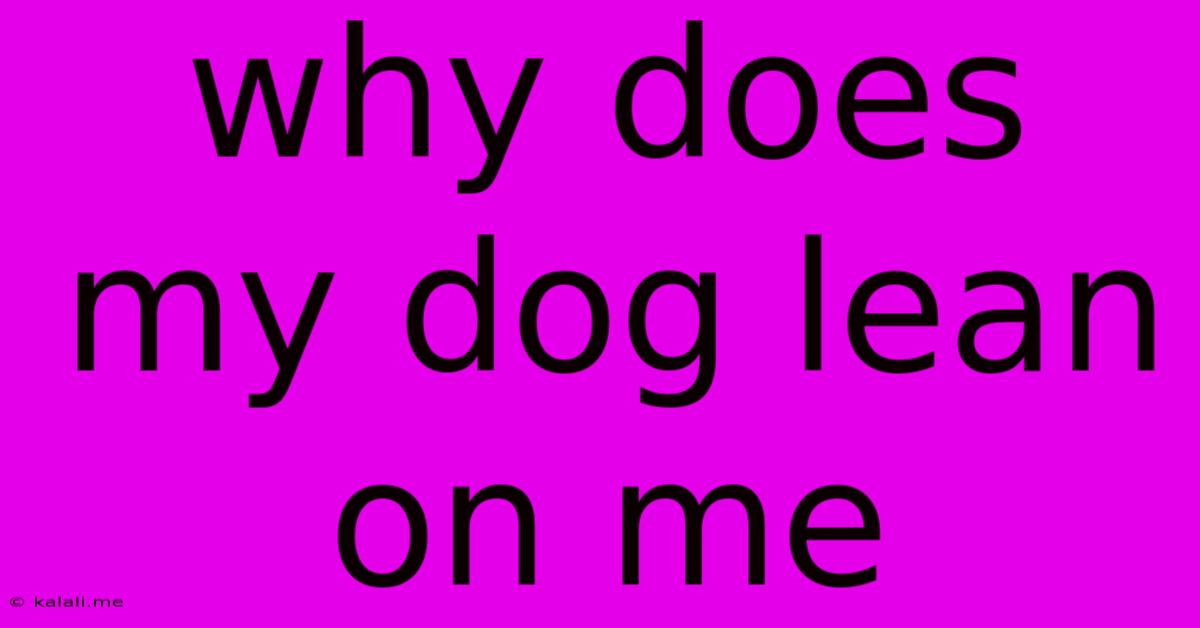Why Does My Dog Lean On Me
Kalali
May 21, 2025 · 3 min read

Table of Contents
Why Does My Dog Lean on Me? Decoding Canine Affection and More
Have you ever noticed your furry friend leaning against you, seemingly for no reason? This seemingly simple act is a complex communication tool revealing much about your dog's emotional state and your relationship. Understanding why your dog leans on you can strengthen your bond and help you better understand their needs. This article will delve into the various reasons behind this endearing behavior, from simple comfort to underlying health concerns.
Why Your Dog Might Be Leaning on You:
There are many reasons why your canine companion might choose to lean on you, ranging from seeking affection to expressing anxiety. Let's explore some of the most common:
1. Seeking Affection and Comfort: The Love Language of Leaning
The most common reason is simple: love and affection. Leaning is a dog's way of physically expressing their bond with you. It's a subtle form of cuddling, showing trust and seeking reassurance. Just like humans find comfort in physical closeness, dogs use leaning to feel secure and connected. This is especially prevalent in dogs who are securely attached to their owners. They feel safe and loved in your presence.
2. Seeking Security and Reducing Anxiety: A Comforting Presence
Dogs, especially those prone to anxiety or fear, may lean on you as a means of self-soothing. The physical presence of a trusted human provides a sense of security and reduces feelings of vulnerability. This is particularly noticeable in stressful situations, such as thunderstorms, fireworks, or vet visits. The weight of your body can be incredibly comforting to a stressed dog, acting as a calming presence.
3. Pain or Physical Discomfort: A Subtle Sign of Illness
While often a sign of affection, leaning can sometimes indicate an underlying physical problem. If your dog is suddenly leaning more frequently, or seems stiff or uncomfortable, it could be a symptom of arthritis, hip dysplasia, or other health issues. Pain in their hips, back, or legs might make it easier for them to lean against you for support. Pay close attention to other symptoms, and consult your veterinarian if you suspect a physical ailment.
4. Seeking Attention and Play: A Clever Strategy
Some dogs are masters of manipulation! Leaning can be a subtle way of getting your attention. If they're leaning on you while staring intently, tail wagging, or making other playful sounds, they might be subtly prompting you for a game, a treat, or simply some more interaction.
5. Dominance or Submissive Behavior: Decoding Body Language
In some cases, leaning can be a display of dominance or submission. A dominant dog might lean on you to assert their presence, while a submissive dog might lean as a sign of deference or seeking protection. Observing other body language cues, such as tail position and ear posture, will help determine the context of the lean.
Understanding Your Dog's Lean:
To better understand your dog's lean, consider the following:
- Context: Where are you? What's happening? Are they stressed?
- Body Language: What's their tail doing? Are their ears relaxed or tense?
- Frequency: Has their leaning behavior increased recently?
- Other Symptoms: Are they exhibiting any other signs of illness or discomfort?
By paying close attention to these factors, you can better interpret your dog's behavior and respond accordingly. Leaning is often a sign of affection, but it's important to be aware of the potential for underlying health concerns. Regular vet checkups and attentive observation are key to ensuring your canine companion remains happy and healthy.
Latest Posts
Latest Posts
-
My Fridge Temperature Is 7 Degrees
May 21, 2025
-
How Long The Israelites Were In Egypt
May 21, 2025
-
Can I Freeze Blue Stilton Cheese
May 21, 2025
-
Can I Put Ceramic Plate In Oven
May 21, 2025
-
Can 17 Year Olds Stay In A Hotel Alone
May 21, 2025
Related Post
Thank you for visiting our website which covers about Why Does My Dog Lean On Me . We hope the information provided has been useful to you. Feel free to contact us if you have any questions or need further assistance. See you next time and don't miss to bookmark.